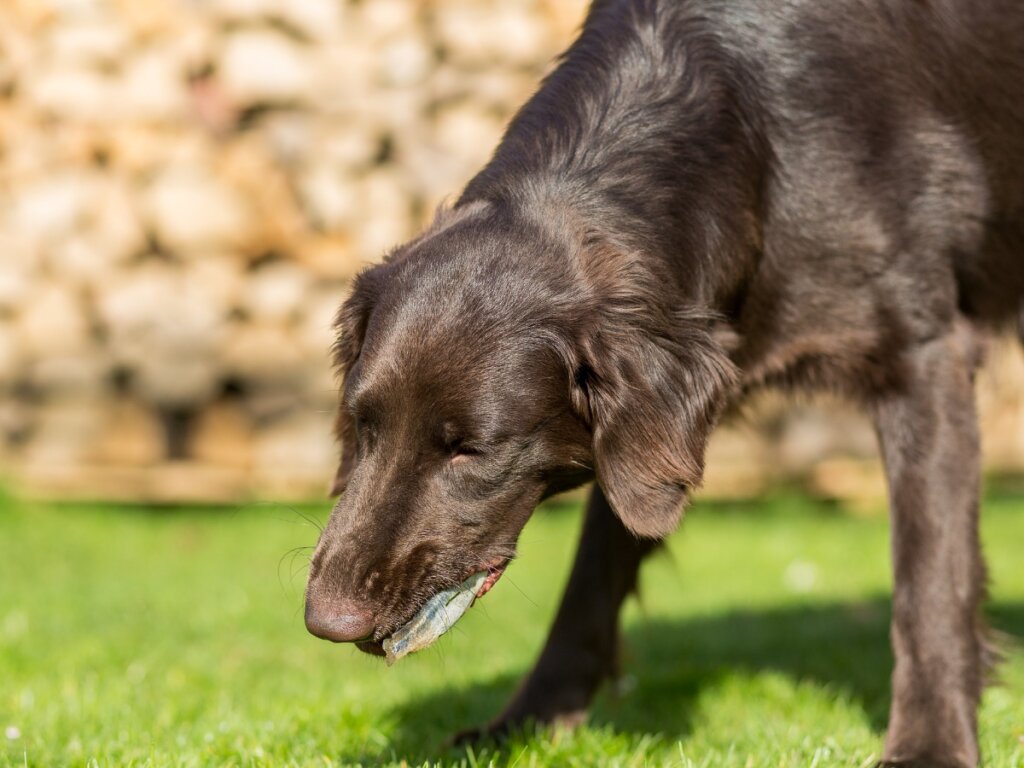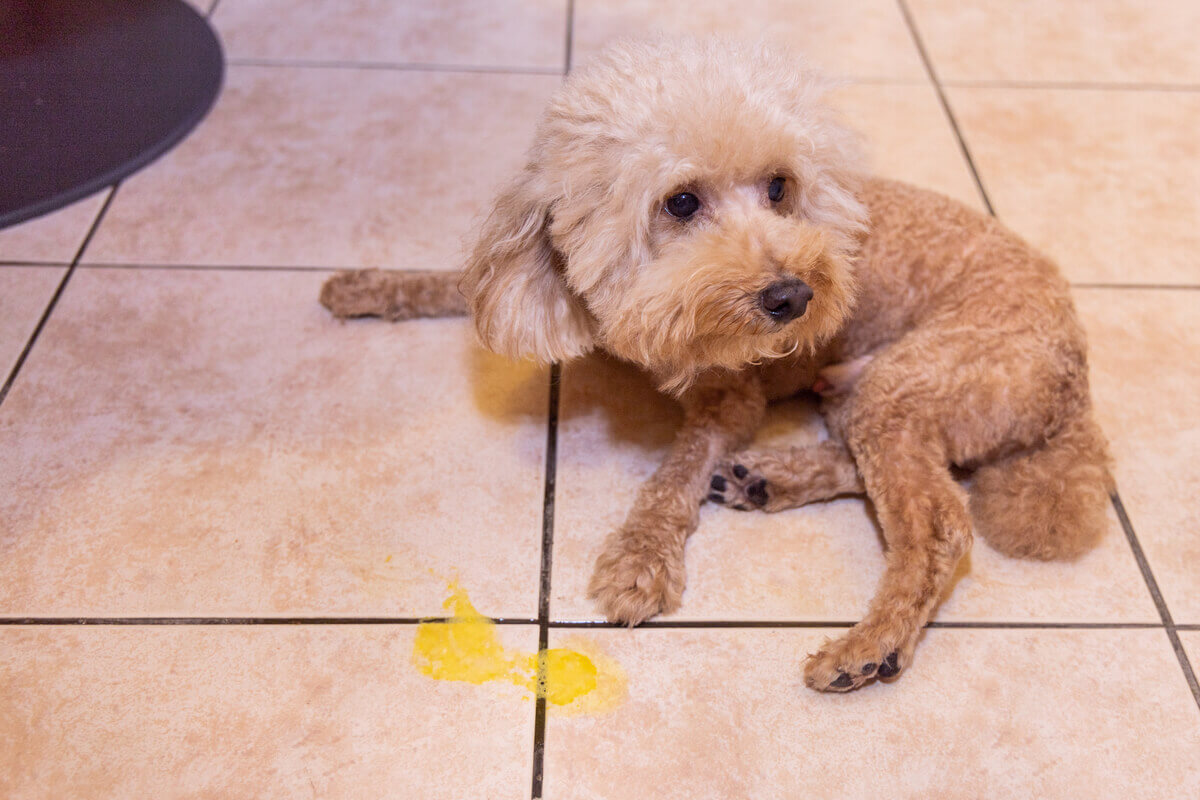7 Reasons Why Your Dog Vomits Bile

The presence of bile in your dog’s vomit is easily identified by its yellowish or greenish color. Finding this substance occasionally need not be a cause for concern, but it’s worth noting it. If, on the other hand, it’s something that happens frequently, you should go to the vet. It’s important to understand why your dog vomits bile. In this article, we’ll tell you the most common reasons for this phenomenon so you can accurately assess when it’s time to go to the vet.
What is bile?
First of all, you have to know what bile is and what functions it has. Bile is a yellowish digestive fluid that’s involved in digestion by emulsifying fats. It’s produced in the liver and, from there, it travels to the gallbladder, where it accumulates for later release during the digestion process.
Bile isn’t expelled from the body unless there’s a problem. In such cases, the body’s reaction is to interrupt digestion and produce vomiting to expel any substance or objects that could harm the animal. Therefore, if, at the moment, there’s bile present in the stomach, it will come out along with the vomit.

Causes why a dog vomits bile
As you can imagine, there are many reasons for a dog to vomit, so it’s easy for many of them to include bile in their clinical picture. In the following sections, you’ll find the most common causes for the presence of bile in your dog’s vomit.
1. Bilious Vomiting Syndrome
This condition, usually idiopathic in origin (i.e. unknown), occurs when bile leaks into the stomach from the small intestine. The most likely causes are having consumed a huge amount of fat, swallowing a lot of grass, or drinking a lot of water. In other words, it’s encouraged by heavy and unhealthy ingestion.
This syndrome also occurs when the dog hasn’t eaten for a long time.
Bile is a highly acidic substance, which is why it causes vomiting. However, when the stomach’s empty, the dog only expels a greenish-yellow liquid (bile) together with gastric juices and perhaps some mucus as a result of irritation of the gastric walls.
2. Pancreatitis
The term pancreatitis refers to inflammation of the pancreas. The origins of this illness are varied, from the administration of drugs to binge eating with large amounts of fat. Pancreatitis vomiting can occur up to 48 hours after ingestion.
Pancreatitis presents with bilious vomiting, dehydration, diarrhea, and severe abdominal pain. It requires veterinary attention so that the dog can restore fluids and electrolytes to the body.
3. Intestinal obstruction
When a dog swallows a foreign object, such as pieces of a toy, rocks, sticks, or bones, it may get stuck somewhere in the digestive tract and cause an obstruction. This problem will cause vomiting in the dog, but when the stomach empties, the only thing that can be expelled is bile.
A foreign body lodged in the digestive tract is a veterinary emergency and usually requires surgery.
4. Gastrointestinal disease
There are several gastrointestinal diseases that cause vomiting, and therefore, the expulsion of bile at some point. These include stomach ulcers, bacterial and viral infections, and some cancers.
The acidity of the bile, if left unchecked, can wear down the walls of the esophagus and lead to ulcers, hiatal hernias, esophagitis, and other digestive diseases. Some breeds are more prone to these diseases, especially toy or brachiocephalic breeds.
5. Liver problems
Since the liver is the organ that produces bile, problems in this organ usually result in an overproduction of this substance. In addition to bilious vomiting, in these cases, you’ll find symptoms such as jaundice–the yellowing of the sclera and mucous membranes of the animal.
6. The dog vomits bile due to allergies
Food allergies are a common cause of vomiting, and when the intake of the problematic food isn’t interrupted, bile eventually appears. It’s relatively common to find this condition in animals that have recently changed their diet, and an immediate return to the previous menu is recommended.
7. Parasitic infestations
Infestation of the digestive system by parasites can cause biliary vomiting. However, this is a rare and worrisome sign, as it indicates that the parasite has spread so far that it’s affecting most of the digestive tract. If this is the case with your dog, take a sample of its stool and vomit and go to the vet urgently.

What to do if my dog vomits bile?
If it’s an isolated case of vomiting bile prior to eating, it’s most likely due to your dog being on an empty stomach. However, if this becomes a pattern or doesn’t show signs of stopping on its own, it’s time to go to the vet.
In any case, prevention will be very useful to avoid cases such as pancreatitis, gastritis, and the ingestion of parasites. Make sure your dog doesn’t pick up anything from the ground and don’t give your pet sticks and stones to play with. In addition, using quality food won’t only ensure that your dog doesn’t develop digestive problems, but will also ensure its basic health.
All cited sources were thoroughly reviewed by our team to ensure their quality, reliability, currency, and validity. The bibliography of this article was considered reliable and of academic or scientific accuracy.
- Cáceres Trimiño, N. (2014). Fisiopatología del vómito bilioso en caninos.
- Enfermedades esofágicas del perro y el gato | PortalVeterinaria. (s. f.). PortalVeterinaria. Recuperado 15 de noviembre de 2021, de https://www.portalveterinaria.com/articoli/articulos/26025/enfermedades-esofagicas-del-perro-y-el-gato.html
- Watson, P. (2004). Pancreatitis in the dog:. dealing with a spectrum of disease. In Practice, 26(2), 64-77.